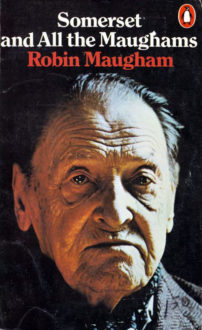 Somerset and All the Maughams
Somerset and All the Maughams
by Robin Maugham
Published by New American Library
Published 1966
History (biography)
274 pgs. • Find on Amazon.com • WorldCat
Reviewed by “G. D.”
July 07, 1966
Somerset And All The Maughams by Robin Maugham, N.Y.. New American Library, 1966.
Never a critically successful writer, but always a good writer, W. Somerset Maugham was truly the worldy-wise man of English letters. His death last year, at age 91, marks the end of an era for he was the last of the great storytellers.
His beloved nephew, Robin Maugham, is doubly fitted to record his life for he is both a writer and the author of several homosexual novels: Behind The Mirror, 1955; Line On Ginger, 1949; The Man With Two Shadows, 1958; The Servant, 1949, etc. Robin Maugham has cleverly used this book to tell the history of the entire Maugham family—and many had interesting lives—but for most readers the portrait of Uncle Willie will be the drawing card.
W. Somerset Maugham’s works are curiously devoid of his own homosexual orientation (his only novel to touch on homosexuality is Theatre, 1937, and the inclusion is lesbian rather than male). It is probably this evasion, in part, which prevented his ever producing a truly great novel since he never wrote of the one conflict which ruled his life.
 Before his short-lived marriage in 1916, to Syrie Wellcome, Maugham met his major love, Gerald Haxton. Publicly Haxton, a handsome youthful American, was Somerset’s secretary. Privately he was his lover and the demon force in his life. They lived together a remarkably long time and were then separated more by circumstances than desire. When World War II broke out, they left Europe. They could not return to England since Haxton had been declared an undesirable alien by the British Government (for his homosexual escapades) so Somerset came to the United States and lived in Parker’s Ferry, South Carolina. Haxton soon became tired of the country life and went to Washington, D.C., where he worked for the war effort for two years. Away from Willie’s sobering influence, he literally worked himself to death. He developed tuberculosis. When Somerset found out, he tried desperately to save him, but the medical help came too late and Gerald Haxton died in 1944.
Before his short-lived marriage in 1916, to Syrie Wellcome, Maugham met his major love, Gerald Haxton. Publicly Haxton, a handsome youthful American, was Somerset’s secretary. Privately he was his lover and the demon force in his life. They lived together a remarkably long time and were then separated more by circumstances than desire. When World War II broke out, they left Europe. They could not return to England since Haxton had been declared an undesirable alien by the British Government (for his homosexual escapades) so Somerset came to the United States and lived in Parker’s Ferry, South Carolina. Haxton soon became tired of the country life and went to Washington, D.C., where he worked for the war effort for two years. Away from Willie’s sobering influence, he literally worked himself to death. He developed tuberculosis. When Somerset found out, he tried desperately to save him, but the medical help came too late and Gerald Haxton died in 1944.
The death of Haxton sent Somerset into a decline and Robin Maugham was sent for to stay with him in South Carolina. Robin’s description of his uncle’s grief is very moving. Maugham eventually recovered, however, and by 1946 was accompanied by a new secretary, Alan Searle, who remained with him until his death in 1965. (Newspaper readers will recall the attention paid to Alan Searle when Somerset disinherited his daughter and made Searle his heir by adoption.) Robin Maugham heaps praise on Alan Searle’s head, and he was obviously the kindest of men. He devoted his every waking moment to the care of the, by then, petulant and cross, old man.
Even Robin Maugham cannot, in his love for his uncle, disguise the fact that Somerset was a social problem as far as his irascible disposition was concerned. This biography is certainly incomplete but it is alive with anecdotes and personal glimpses and those intimate “cracks” for which Maugham was justifiably famous. In all it is a loving record of a remarkable man and a remarkable family.
G.D.[1]“Gene Damon?”
Originally published in Tangents, July 1966.
© 1966, 2018 by The Tangent Group. All rights reserved.

